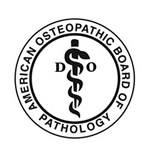American Osteopathic Board of Pathology
 | |
| Abbreviation | AOBPa |
|---|---|
| Formation | 1943[1] |
| Type | Professional |
| Headquarters | Chicago, Illinois, IL[1] |
| Coordinates | 41°53′39″N 87°37′08″W / 41.8942°N 87.6190°W |
Chair | Gregory McDonald, D.O.[1] |
Vice-Chair | Alan F. Henke, D.O. |
Secretary-Treasurer | Karen P. Kantor, D.O. |
| Website | aobpath.org |
The American Osteopathic Board of Pathology (AOBPa) is an organization that provides board certification to qualified Doctors of Osteopathic Medicine (D.O.) who specialize in the diagnosis and characterization of disease in patients following thorough examination of biopsies and/or bodily fluids (pathologists).[2] The board is one 18 medical specialty certifying boards of the American Osteopathic Association Bureau of Osteopathic Specialists approved by the American Osteopathic Association (AOA),[3][4] and was established in 1974. As of December 2011, 55 osteopathic pathologists held active certification with the AOBPa.[5] In addition to fellows of the American Board of Pathology, board certified osteopathic pathologists are eligible for admission to the College of American Pathologists and to the American Society for Mohs Surgery.[6][7]
Board certification
To become board certified in pathology, candidates must have completed an AOA-approved residency in pathology. Additionally, candidates must have successfully completed the required clinical, oral, and written exams.[8] Since 1995, board certified osteopathic pathologists must renew their certification every ten years to avoid expiration of their board certification status.[8][9][10] The AOBPa oversees examination of candidates in the areas of anatomic pathology, dermatopathology, forensic pathology, and laboratory medicine. Additionally, the AOBPa provides a Certificate of Added Qualifications in dermatopathology and a Certificate of Special Qualifications in forensic pathology.[8][9][11]
See also
References
- ^ a b c "About AOBPa". American Osteopathic Board of Pathology. 2010. Archived from the original on 31 July 2013. Retrieved 17 September 2012.
- ^ University of Illinois College of Medicine at Peoria (2011). "An Introduction to Pathology". University of Illinois at Chicago College of Medicine. Archived from the original on 2014-07-17. Retrieved 17 September 2012.
- ^ "AOA Specialty Certifying Boards". American Osteopathic Association. Archived from the original on 2012-06-01. Retrieved 17 September 2012.
- ^ "American Osteopathic Board of Pathology". Health Workforce Information Center. 2011. Archived from the original on 29 October 2013. Retrieved 15 September 2012.
- ^ Ayres, Ronald E; Scheinthal, S; Gross, C; Bell, E (April 2012). "Changes to Osteopathic Specialty Board Certification". Journal of the American Osteopathic Association. 112 (4): 226–231. Archived from the original on 4 March 2016. Retrieved 17 September 2012.
- ^ "Forensic Pathology". College of American Pathologists. 2012. Archived from the original on 24 October 2012. Retrieved 18 September 2012.
- ^ "Fellow Member". American Society for Mohs Surgery. Archived from the original on 28 October 2012. Retrieved 18 September 2012.
- ^ a b c "Application Handbook" (PDF). American Osteopathic Board of Pathology. 2012. Retrieved 17 September 2012.[permanent dead link]
- ^ a b "Medical Boards: Osteopathic". Castle Connolly Medical,Ltd. 2011. Retrieved 17 September 2012.
- ^ "Recertification". American Osteopathic Board of Pathology. Archived from the original on 24 February 2013. Retrieved 17 September 2012.
- ^ "Specialties & Subspecialties". American Osteopathic Association. Archived from the original on 2015-08-13. Retrieved 17 September 2012.
